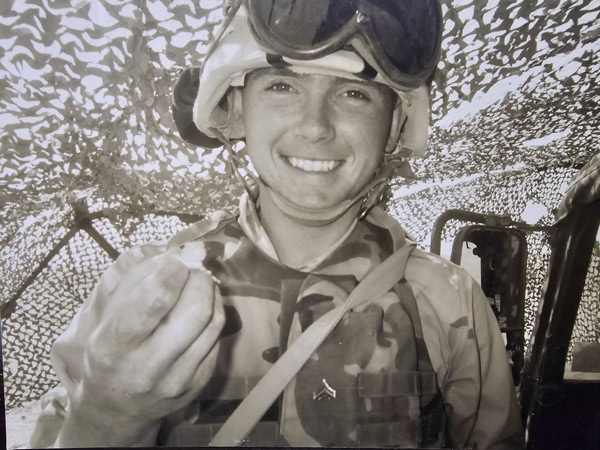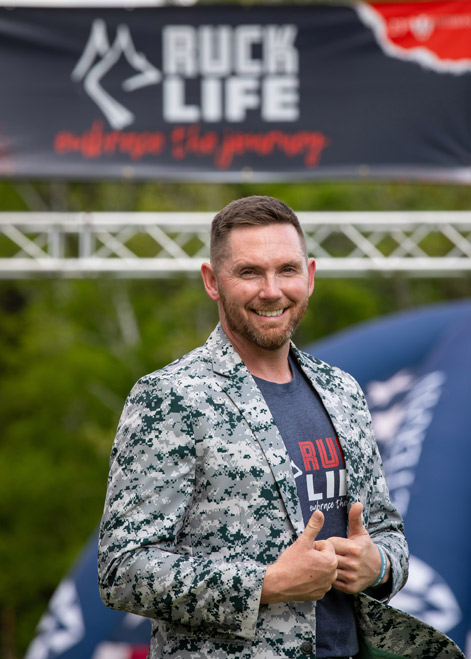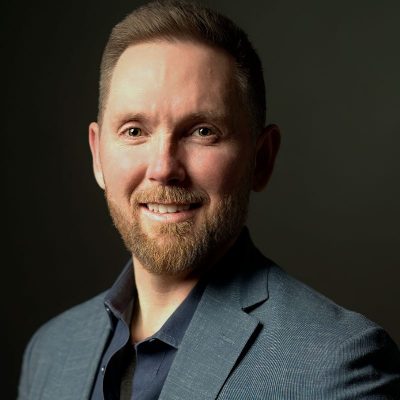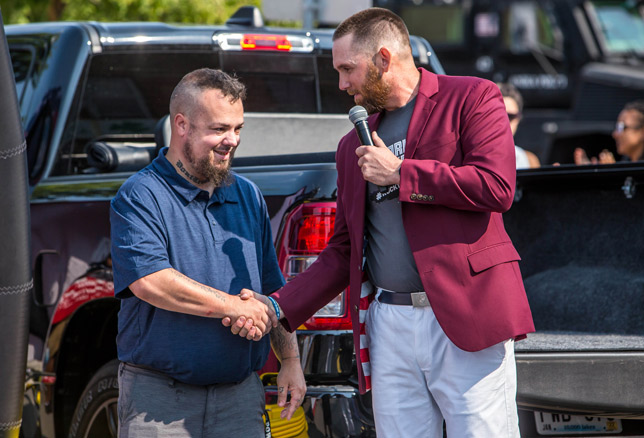It all started with some intense nightmares
In the dreams, Mike Waldron was in Iraq, in the middle of combat, and maybe he’d run out of ammunition or suffer a weapon malfunction at the worst possible moment. Or maybe someone close to him in the unit was fatally hit, and it was on Mike to use whatever was at hand to put them out of their misery. Only nothing he’s doing seems to be working. It’s all just creating more pain. After his separation from the Marine Corps, the nightmare scenarios moved from Iraq to home. And the wounded he was trying to show mercy to were beloved friends and family.
The nightmares escalated in their intensity and frequency, and alongside them, what started as social anxiety when he got home turned into panic attacks. A crowd of kids walking by could trigger serious attacks, flooding his system with adrenaline as if he made contact with the enemy. His heart pounded through his chest, his hands shook, his brain screamed he was in immediate life-or-death danger. Severe panic attacks are often described as feeling like heart attacks, and Mike was suffering them daily, often multiple times a day.
How would it impact your quality of life if you experienced what felt like 2-5 heart attacks a day, every day? Could you hold down a job? Could you contribute to your family? Could you make new friends?
By 2008, not long after Mike’s 2004 separation from the Marines, combat-related nightmares and panic attacks were part of his daily reality. He wasn’t sleeping much at all. The panic attacks were debilitating. He wasn’t being a good employee or husband. It was his marriage that broke first. Not long after, he recognized things just weren’t sustainable. Mike needed to understand what was happening to him.
Mike's Military Service

Mike enlisted in the Marine Corps infantry in the summer of 2000, and initially deployed to Okinawa, Japan. He got to visit Australia and help build schools in Indonesia. As the world watched the 9/11 attacks on television, his unit prepared to potentially extract the US Ambassador due to escalating riots in Indonesia.
In January of 2003 the Marine Corps transferred Mike to Kuwait with the Second Battalion, Fifth Marines as part of a troop build-up prior to launching Operation Iraqi Freedom. He spent two months digging holes until, on his 21st birthday, the second Iraq War began in earnest. He spent the day taking enemy prisoners of war.
Mike remained in country until August of 2003, participating in the rebuilding of Samawah. He rotated stateside after his tour, and separated the following May to Minnesota with his wife, moving in with his in-laws
29% of post 9/11 veterans alive today have had PTSD symptoms at some point in their life.
About half as many have reported symptoms in the past year. A 2021 study by Brown University estimated that over 30,000 post 9/11 veterans had died of suicide. Learn more about veteran post-traumatic stress here.
Finding His Own Remedy
 Mike started researching his symptoms, and learning about post-traumatic stress and why it happens. He learned about the Brain-Derived Neurotrophic Factor (BDNF), a chemical released in our brains during times of acute stress to supercharge our memory-making system to create triggers. These triggers are meant to establish pattern recognition to help us avoid that life-threatening situation in the future.
Mike started researching his symptoms, and learning about post-traumatic stress and why it happens. He learned about the Brain-Derived Neurotrophic Factor (BDNF), a chemical released in our brains during times of acute stress to supercharge our memory-making system to create triggers. These triggers are meant to establish pattern recognition to help us avoid that life-threatening situation in the future.
For instance, if you survive an attack from a mugger while crossing an alley with a fire hydrant near it, your subconscious might start preparing your body for fight or flight whenever you cross an alley or even see a fire hydrant in the future. This is thanks to the BDNF that flooded your system while fleeing the initial attack.
Mike’s brain was telling his body he wasn’t safe. This is an amazing trait to have in a combat zone, where it might help you avoid an ambush or an IED. But, when he’s stateside and his subconscious is seeing every backpack as a threat and every crowd of people is closing enemy contact? Mike’s brain starts sending adrenaline to prepare for combat, and when it doesn’t come, it ultimately sends him into a full-on panic attack. It’s untenable.
But Mike recognized that the mechanism of the problem contained part of his solution. If, when his brain releases BDNF during high stress to create these trigger memories, maybe he could trick his body into releasing BDNF and somehow overwrite or rewrite those triggers. Mike learned that any time you get your heart rate up, your body releases some BDNF. So, he dived into a combination of self-directed exercise and positive exposure to his triggers.
It wasn’t quite that simple, of course. Still, Mike saw immediate benefits, and he knew he was onto something. He had his last nightmare in 2014. And in 2015, he reached out to a team of psychologists. Together, they optimized what was working for Mike into a more formal treatment plan that they could share as 23rd Veteran.
Connecting With IVMF
Mike was part of IVMF’s Entrepreneur Bootcamp for Veterans (EBV) through the Purdue campus in 2013. He initially thought his playbook would apply for staff in his for-profit business, sharing his combination of exercise and positive psychology in group settings. It became very clear over the course of EBV that he could do more good as a non-profit sharing his experience and program with veterans.
It wasn’t long after EBV he started running the program for veterans and immediately saw the impact. Veterans were reclaiming their lives just like he had, and he found it gratifying beyond measure. Running the program was also helping him, personally. Not just with his post-traumatic stress symptoms, but in finding a mission and purpose in his post-service life.
“The support I’ve received from IVMF has been truly transformative, both for me personally and for 23rd Veteran. They’ve provided the tools, mentorship, and network that have allowed us to expand our reach and impact the lives of veterans on a larger scale. IVMF’s commitment to veteran entrepreneurial success has empowered us to bring innovative solutions to mental health care, helping veterans not just survive, but thrive. Their partnership has been instrumental in our growth, and I am incredibly grateful for their belief in our mission..”

Mike Waldron
Founder, Executive Direcor, 23rd Veteran
Sharing His Breakthrough
Since 2015, Mike has been running 23V Recon teams through the reconditioning program, and watching service members thrive. The initial 14-week program is intense. Up to a dozen veterans go on a weeklong outdoor wellness adventure, usually surviving in the wilderness of Alaska, Florida, or California. This experience builds rapid trust within the group, which makes the rest of the program possible. When they return, they are committed to 13 weeks of programming with their group three days a week.
A typical session includes a one-hour workout at a gym, followed by 30 minutes of positive psychology reconditioning. The sessions target the release of serotonin, dopamine, oxytocin, and endorphins in turn. Then, on Saturdays, they do what they call “Fury Associations”, which is a more social gathering of the group in and around places that include specific common triggers for combat veteran sufferers of post-traumatic stress. Together, the group creates positive associations with these triggers, reducing the power they hold to hijack the body’s fight or flight reflex. The participants find this reduces or even eliminates many post-traumatic stress symptoms over time.
The results are so transformative, Mike currently has program participants driving some 400 miles a day to participate.
Big Milestones

Currently, 23rd Veteran meets its operational expenses through Rucking fundraisers called Ruck Life in the cities where they’re running the program. Their 2024 events in Duluth and Twin Cities raised nearly $150,000 for the program, and also donated over 13,500 pounds of food to homeless and food insecure veterans. Each event was attended by hundreds of people looking to support the program.
Mike has run 16 groups through 23V Recon in five cities, with about 130 graduates. His 17th is about to graduate at the end of September 2024. Mike knows what he’s doing works. While he’s previously run programs and fundraisers in California, Delaware, Pennsylvania, 2024 has focused on consolidating programming and fundraising in Mike’s home state of Minnesota.
Looking ahead, Mike is hoping to stabilize their revenue stream. He’s interested in exploring funding partnerships, fundraising events, and even government contracting as he expands the program throughout the state of Minnesota. He hopes to eventually see his program made readily available to transitioning servicemembers, so veterans don’t have to wait for their post-traumatic stress symptoms to get so severe before looking for solutions.
It's Your Time
Entrepreneurship Bootcamp for Veterans (EBV)
Have you recently launched a business and you’re struggling to make it your primary income stream? Aren’t sure how to operationalize your million dollar business idea? IVMF’s Entrepreneurial Bootcamp for Veterans (EBV) surrounds you with like-minded veterans in an online training program followed by a free 9-day residency at one of our nearby university partners. You’ll leave with a foundational understanding of business management and concrete steps to achieve your entrepreneurship dreams.
